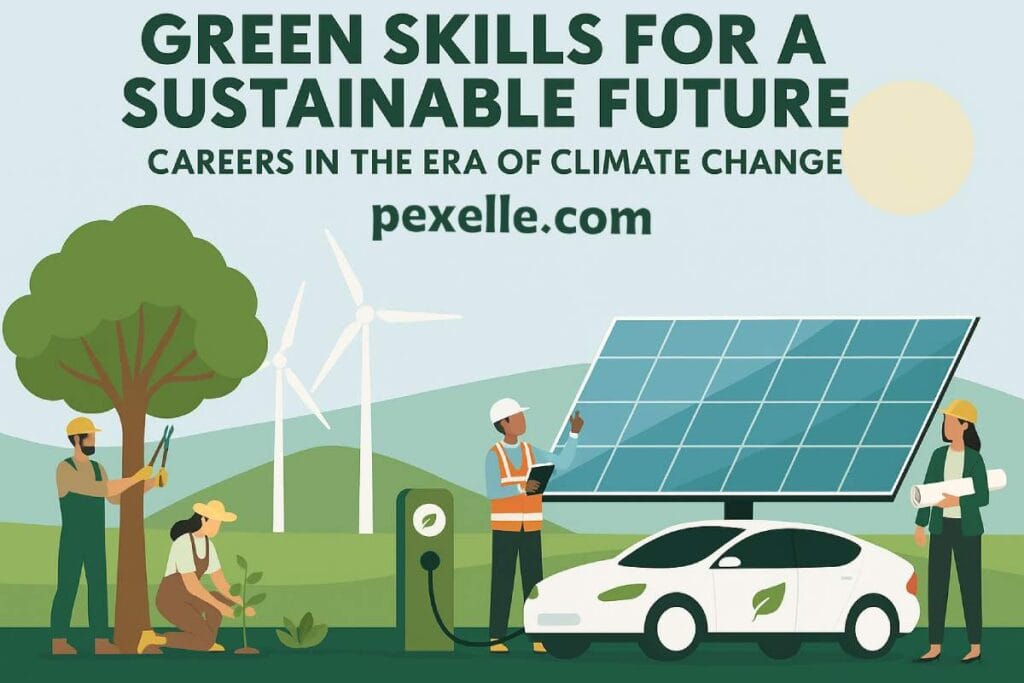Green Skills for a Sustainable Future: Careers in the Era of Climate Change

Introduction: Why Green Skills Matter
The climate crisis is no longer a distant threat—it is a reality shaping the way we live, work, and do business. As governments, companies, and communities move toward sustainability and net-zero goals, there is a growing demand for professionals with green skills. These are the abilities and knowledge needed to support environmentally responsible practices across industries.
From renewable energy engineers to sustainability analysts, careers are evolving rapidly, creating new opportunities for those prepared to work at the intersection of technology, environment, and economy.
What Are Green Skills?
Green skills go beyond traditional environmental science. They include:
- Technical knowledge: Understanding of clean energy systems, sustainable agriculture, and eco-friendly manufacturing.
- Analytical abilities: Capability to measure carbon footprints, analyze environmental impact, and design solutions.
- Policy & compliance awareness: Knowledge of environmental laws, ESG (Environmental, Social, Governance) regulations, and international climate agreements.
- Soft skills: Communication, collaboration, and change management to implement sustainable practices within organizations.
In short, green skills enable professionals to create economic value while reducing environmental harm.
High-Demand Green Careers in the Climate Era
- Renewable Energy Engineers – Designing and managing solar, wind, and hydropower projects.
- Sustainability Consultants – Advising companies on energy efficiency, waste reduction, and ESG compliance.
- Environmental Data Analysts – Using AI and big data to track emissions, predict risks, and optimize resources.
- Green Construction Specialists – Implementing eco-friendly materials and energy-efficient designs in buildings.
- Circular Economy Managers – Reducing waste through recycling, reusing, and remanufacturing processes.
These careers offer not only financial stability but also a purpose-driven mission to protect the planet.
Future Trends: How Technology is Powering Green Skills
The green economy is merging with cutting-edge technologies like AI, IoT, and blockchain to make sustainability smarter and more efficient. For example:
- AI-powered energy grids reduce electricity waste.
- IoT sensors track water usage in agriculture.
- Blockchain ensures transparency in carbon credit trading.
Professionals with both tech and green skills will be at the forefront of this transformation.
How to Build Green Skills
- Online Courses & Certifications: Platforms like Coursera, edX, and LinkedIn Learning offer courses on renewable energy, ESG, and climate policy.
- University Programs: Many universities now have specialized degrees in sustainability and environmental engineering.
- Industry Experience: Internships in energy, agriculture, or construction sectors with a focus on green practices.
- Networking: Joining professional groups like the International Society of Sustainability Professionals (ISSP).
Building a blend of technical expertise and practical experience is key to staying competitive.
Conclusion: A Career That Shapes the Future
The transition to a low-carbon economy is creating millions of green jobs globally. Professionals who develop green skills will not only secure future-ready careers but also play a vital role in addressing one of humanity’s greatest challenges—climate change.
The era of green careers is here, and those who act today will lead the sustainable future of tomorrow.
Source : Medium.com




